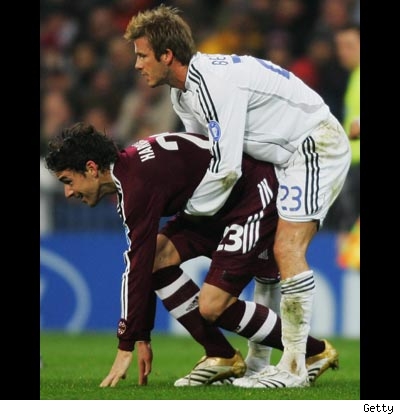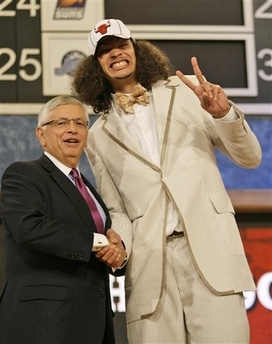Big Ten commissioner Jim Delaney caused a stir last week by mentioning that conference expansion might be on the table for a school other than the usual suspect of Notre Dame. Last year, I argued for Syracuse as being the best choice other than the Fighting Irish for a 12th team and I still stand by that. Rutgers has a great location near New York City, but it’s going to take a whole lot more than one good football season to make them a viable candidate. The always entertaining mgoblog, even though it supports the enemy, had an intriguing comprehensive write-up on the potential additions. That being said, I disagree with his analysis. If the Big Ten goes in a direction other than Notre Dame, I believe that it’s got to be toward the East Coast as opposed to adding onto the fringes of the Midwest. We need to look to expand our boundaries instead of looking inward. Anyway, here are some links:
(1) Certain Degrees Now Cost More at Public Universities (New York Times) – A number of public universities, including the University of Illinois, are starting to charge more for engineering and business programs compared to the rest of school. I’m glad I got in and out when there was still flat pricing.
(2) Celtics, Wolves Closing in on Deal (ESPN.com) – This was exactly what I was worried about: Kevin Garnett coming to the Eastern Conference to a team other than the Bulls. Even though Ray Allen and Paul Pierce are on the downsides of their careers, adding KG to Boston will catapult that team from the doghouse to the upper echelon of the East. Do I have confidence that the Bulls would be able to shut that team down in a head-to-head playoff series? Nope. Joe Smith is a decent power forward, but it’s not as if though he’s leaps and bounds better than P.J. Brown. Assuming Dwyane Wade are healthy next year, I would put the Heat (don’t read too much into the Bulls’ sweep with Wade at half-strength), Cavs, Celtics, and Pistons ahead of the Bulls next year. I know I’m beating the proverbial dead horse here, but this is what happens when you don’t have a superstar – other teams pass you by pretty quickly (i.e. the Cleveland Cavaliers of the early-90s). This Garnett deal isn’t set in stone yet, so maybe the Bulls can make one last run at him, yet it’s extremely disappointing that they haven’t tried already.
(3) How Do Cats Like Rabbits? Very Much, And Preferably Raw (Wall Street Journal) – In response to the pet foot contamination scare from earlier this year, raw rabbit has all of the sudden become a hot commodity among cat owners. This might be something my cat would go for, but he’s already ridiculously spoiled. I honestly think that he believes my wife and I are his pets, considering that he’s the one that’s fed on demand and gets his poop picked up everyday.
(4) A Dark – But Not So Secret – ‘Knight’ For Sequel (Chicago Tribune) – Since my office is right by some entrances to Lower Wacker Drive, I’ve been seeing props for the new ‘Batman’ movie all over the place, including a Gotham City police car and paddywagon. Other than that, though, the filmmakers seem to be keeping the shooting under tight security.
(5) It’s Official: The Cubs Are Awesome (Goat Riders of the Apocalypse) – Don’t get too cocky, guys. Meanwhile, I’ll just go back to seeing who will be left on the South Side by the end of the day.
(6) Briggs Signs (Da’ Bears Blog) – Despite an offseason of Drew Rosenhaus-fueled acrimony, Lance Briggs will back in Chicago for one more season. Only a month until football season – I’m getting all tingly inside.
And finally…
To my horror when I went out to lunch today, the Chinese chicken place (it was one of those places that just had two neon signs that said “Teriyaki” – despite having little in the way of Japanese food offerings – and “Chicken”, kind of like a roadside restaurant that is identified by only an “Eat” sign or the “Hot” pancake syrup at IHOP) at the Citigroup Center food court in the Loop has been shutdown. If you’ve ever been in that food court, you know exactly what I’m talking about: $6.05 after tax for a heap of fried rice plus two different types of fried MSG of your choice. With the cheapest lunch in the Loop outside of McDonald’s pushing towards $10, the Chinese chicken place was an oasis of full and inexpensive goodness. I have no idea why it has closed since it has always had the longest line in that food court. The obvious thought would be health code violations, but normally there would be notices with respect to that and there none visible. Anyway, this has been such a terrible blow to me (I’m seriously getting the shakes just thinking of the Cashew Chicken/Sesame Chicken combo that I’d always get) that I just had to get it out. R.I.P., Chinese chicken place.


